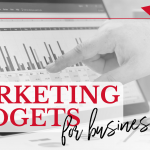Marketing is an important ingredient in the success of any business. Whether you’re running a B2B or a B2C, marketing is the means by which you can spark interest among potential customers and strengthen your connection with existing ones. More than just advertising and selling, marketing can also help businesses foster relationships with their customers, and promote growth and long-term customer satisfaction. No matter how innovative your products or services may be, without marketing, you are unlikely to find your target audience.
However, as with any business, marketing comes with a cost. This begs the question: how much money should you allocate toward marketing strategies?
How Much Should Your Marketing Budget Be?
As vital as this question is, there’s no cut-and-dry answer. After all, there are many factors to be considered when determining a budget for your marketing efforts. Some of these include, but aren’t limited to:
● Total revenue
● Business niche and industry
● Market position
● Goals and objectives
● Desired speed of growth
● Actual stage of growth
● Target audience
● Marketing platform
Naturally, smaller businesses or start-ups with more limited finances may have a more difficult time figuring out how much to should set aside for their marketing budget. The U.S. Small Business Administration recommends allotting 7% to 8% of a small business’ revenue to marketing, if they’re making less than $5 million in sales and their net profit margin, after deducting all expenses, falls within the 10% to 12% range.
A common rule of thumb is that a business’s marketing budget should be between 2% and 5% of revenue. This can also be applicable to B2B companies. B2C companies, on the other hand, may need to invest a higher percentage, ranging between 5% and 10% of their revenue, in order to take advantage of more marketing channels to reach a broader range of customers.
Of course, depending on your business and target objectives, you can choose to allocate as much as 20% of your revenue to marketing. The key is to make every penny count, and you can only do this when you set up a marketing strategy and budget for your business.
How To Set Up a Business Marketing Budget
When coming up with a plan for your marketing budget, think of your marketing efforts not as an expenditure, but as an investment. In doing so, you’ll be able to think about the long-term results that you want to achieve, and in terms of marketing, this is often to grow your customer base and keep satisfied customers engaged with your business.
Regardless of how much you can actually set aside for your marketing budget, here are some steps you can take to come up with a competent marketing plan that puts every penny to good use:
When coming up with a plan for your marketing budget, think of your marketing efforts not as an expenditure, but as an investment.
Clearly Define Your Goals
Not having a clearly defined goal is like blindly driving a car: you don’t know where you’re going or how to get there. Your objectives will largely dictate which steps are best to take for your marketing efforts to bear fruit in the long run. Having clearly defined goals will also help you craft an appropriate time frame within which your campaign should ideally run. With this in place, you will be able to determine how much you should spend for a certain type of marketing campaign and for how long.
Consider Your Platform
There are a myriad of channels you can use to market your products and services. Aside from traditional advertising platforms like TV, radio, and print, digital marketing continues to be at the forefront. Social media such as Facebook, Twitter, Instagram, and Pinterest are home to millions of users each month, but it is important to note that social media marketing is only one of many strategies worth utilizing.
Depending on your target audience, you may need more than just social media marketing to attract attention and foster engagement that can lead to conversions. Keep in mind that not all people have social media accounts, and this applies to both B2C and B2B clients (although businesses would likely have at least one social media account if they’re also taking advantage of an internet-based audience). In some cases, email marketing or traditional marketing may be more effective, especially if you’re targeting an older customer base or a more established business.
Knowing which platform to use will allow you to set aside a budget for the tools required for each one. For instance, if you’re going to opt for video marketing, you have to take into account the cost of the necessary recording and camera equipment. If you opt for email marketing, you may need to purchase customer relationship management (CRM) software to keep track of your email list.
More than just advertising and selling, marketing can also help businesses foster relationships with their customers, and promote growth and long-term customer satisfaction.
Use Tracking Tools
When budgeting, it’s also important to keep track of your expenditures, as well as your return on investment. This can be done using either advanced tracking tools such as Google Analytics for digital marketing, or even a simple spreadsheet for other campaigns. Having a good system will allow you to track your budget and see what additional costs or savings you’ve incurred. It will also help identify ineffective segments of your campaign which may need adjusting or elimination.
Review Your Plan
There’s no such thing as a perfect marketing plan, but what distinguishes an effective one from an ineffective one is a plan’s ability to be flexible and adaptable. To do this, you must regularly evaluate your performance and refine and adjust your budget as necessary. A marketing budget review is a good thing to consider in tandem with your regular brand audit. Keep in mind that change is constant so you’ll need to be able to adapt and budget accordingly.
How Much Is Your Customer Worth?
Knowing your brand and your target audience is essential for determining an appropriate marketing budget. Developing a plan with an eye to your long-term goals and objectives and the ability to adapt will help you spend your marketing dollars strategically and effectively. Remember, your marketing budget is an investment in the future that allows you to create and retain customers.






